Related:
How to read nutrition labels
One of the reasons that I started writing about food was because there wasn't much information available. At the time the government didn't require that manufacturers list nutrition information on their packages, but with all this extra information it helps if you know how to use the Nutrition Facts box.
Are we ready to cut salt?
If you're reading this, you're probably well aware that the average American eats far more salt than is good for them, with estimates of the average sodium intake ranging from 3,400 milligrams to over 10,000 milligrams per day. The vast majority of the salt in foods comes not from the individual diner adding it at the table, but rather it is added during cooking (or processing).
It's easy to get answers about health and nutrition! Just send your question by email to [email protected] and Dr. Harlan will respond to selected questions of general interest. Answers will be posted in the Ask Dr. Gourmet newsletter (sign up now!) and archived in the Ask Dr. Gourmet section of the website.
Please note that the Ask Dr. Gourmet feature is restricted to questions regarding food and nutrition. Due to the many questions we receive, not all questions may be answered. For more specific questions about your individual health, please contact your doctor. About Timothy S. Harlan, MD, FACP, CCMS | Terms of Use | Privacy Policy
Ask Dr. Gourmet
Are Smart Balance products really a healthy choice?
Are the Smart Balance butter replacement spreads a wise choice? I try to use mostly olive oil, but sometimes a "butter" product is good. The company makes a lot of claims about benefits, and what about their milk, mayo, peanut butter etc. Do you have any opionions on this?
Dr. Gourmet Says...
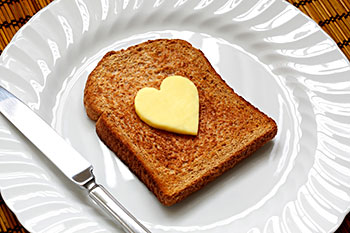
I think that their spreads are an OK choice. Smart Balance is higher in monounsaturated fats and was one of the first spreads to eliminate trans fats. I have used their spread as well as Promise products in developing some recipes on the Dr. Gourmet web site. One of the best applications is in baking, as they are lower in calorie but cream together well with sugar and egg yolks for a good batter. In most cases I recommend folks use these occasionally and in sparing amounts.
As far as their other products, I have not used them so I can't speak to their quality. Personally, I don't see a reason to enrich milk or peanut butter with Omega-3 fats. Using great quality fresh ingredients is the key to healthy eating and there's no evidence that using these products does much of anything but cost more because they have additional processing or ingredients. I wouldn't recommend paying extra for them. For instance, if you can purchase a great quality freshly ground peanut butter or one that has no additives for less, there's no reason to pay more for the Smart Balance.
Also be careful about added ingredients. In the case of the peanut butter they add sugars and salt, both of which are unnecessary. I am not sure why anyone would want all those extra ingredients, but the folks at Smart Balance feel that they are somehow better for you (seems an unlikely thought process to me).
Here's their nutrition label and one from Smuckers Natural Peanut Butter (although I generally buy my peanut butter at the health food store freshly ground):
Smart Balance Peanut Butter
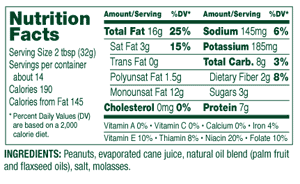
Smuckers Natural No Salt Added
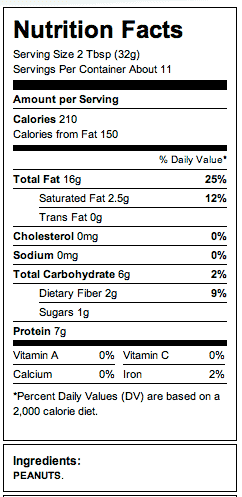
Likewise, here's their Nutrition Facts for Smart Balance Sour Cream (wow, that's a lot of ingredients for an innocent little product):
Smart Balance Sour Cream
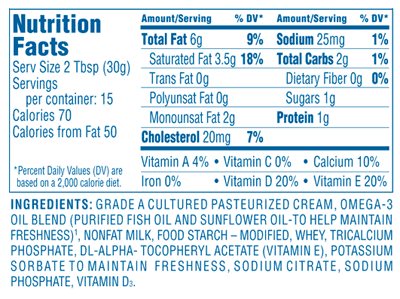
And one from Daisy brand sour cream (Hmm... one ingredient: cream. Imagine that.):
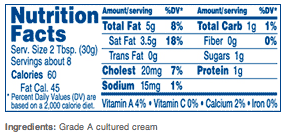
In both cases, extra calories and salt for no particular reason.
When I am looking at food labels I never pay attention to what is printed on the front. Brand names, words like "natural" or "healthy" and claims such as "low fat" or "low carb" are best ignored. Catchy phrases like Smart Balance should make you suspicious. Look and compare the ingredients. Note the added sugars, salt and other bizarre ingredients (do you really need modified food starch in your sour cream?). Look at the amount of salt, sugar and other nutrients along with the ingredient list and choose the fresher, less processed product.
Thanks for writing,
Timothy S. Harlan, MD, FACP, CCMS
Dr. Gourmet
